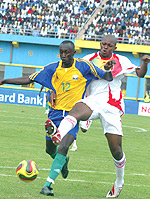Rwanda losing to Ghana in the decisive group B game didn’t come as a surprise to many, in fact neutrals would say, it was a case of the inevitable happening. The host nation Rwanda had their dim hopes of reaching the semifinals of the continental showpiece prematurely cut out by the 2-0 defeat against a team gunning for their third African Youth Championship title.


Rwanda losing to Ghana in the decisive group B game didn’t come as a surprise to many, in fact neutrals would say, it was a case of the inevitable happening.
The host nation Rwanda had their dim hopes of reaching the semifinals of the continental showpiece prematurely cut out by the 2-0 defeat against a team gunning for their third African Youth Championship title.
Rwanda needed to win or at least draw and hope that results in their other decisive group A game between Cameroon and Mali go their way to be able to reach not only the last four but most importantly the World Youth Championship.
But the equation totally dive-nosed for Obradovic Tomislav’s side, playing at the finals of the championship for the first time, leaving them and all Rwandans counting it as a missed opportunity to rub shoulders with the best youth talents from across the world.
Instead of sulking and moaning about a missed opportunity and opting to stay away from the stadiums for the reminder of the tournament, it would only be best to make sure the positives of Rwanda’s early exit outweigh the negatives so that everyone concerned learns some lessons despite the obvious disappointment.
Remarkable debut
Believe it or not, but four points from three matches against more experienced but mostly importantly, better equipped opponents like Mali, Cameroon and Ghana is quite an achievement for debuting Rwanda.
When the draws were made, some people described group A as the ‘group of death’ but considering that group B had Nigeria, Egypt, Ivory Coast and South Africa, the term ‘Group of Death’ becomes relative in this case.
The 2-1 win over Mali in the tournament opening match was followed by a deserved 1-1 draw against Cameroon, which raised the appetite for more success of most Rwandans to unprecedented levels until the inevitable 2-0 loss to Ghana brought those expectation levels down to normal.
In the process, Rwanda scored three very good goals ironically all headers, that’s an average of a goal per game and conceded four, which accounts for 1.3 goals a game.
Try to compare that with Mali’s records of no win in three, seven goals conceded and only one scored as well as Ivory Coast’s three straight defeats in group B with six goals conceded and only one scored.
Of the four teams that exited the 16th African Youth Championship, only Egypt went out with a better record. The youth Pharaohs beat Nigeria and South Africa, two sides that ironically went on to qualify for the last four courtesy of a better goal difference.
Despite their early exit, Egypt are assured of a place at the next World Youth Championship scheduled for September this year as host nation.
Good experience
Making an outstanding debut at the finals of this championship was in itself good enough for the players and Rwanda’s football altogether but the tournament is also a good exposure for the players, all of whom play their club football at home.
Apart from Haruna Niyonzima, Jean Mugiraneza, Elias Uzamukunda and Eric Bakame, who had played in high profile games before, this tournament provided the other players with the best possible ground to play against the best young talents on the continent, something they did with high regard.
No one can fault Tomislav and his players for not giving their best. Under the circumstances, they did the best they could and achieved the best they could.
Considering the pedigree and history of all eight teams that qualified for the 2009 championship, Rwanda’s column had the worst reading but to go out the way they did, their reading is bound to be very different when the next ranking comes out some time this year.
Whoever came with the old English saying that, ‘experience is the best teacher’ must have had Rwanda’s U-20 team in mind, lets hope that whoever is concerned will be able to derive some lesson from the 16th African Youth Championship, Rwanda 2009.
Ends


